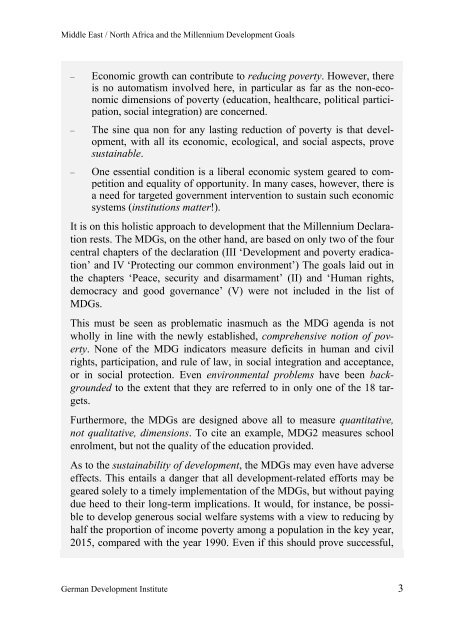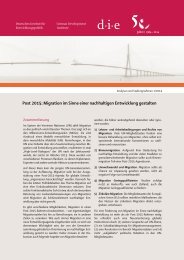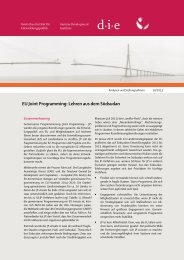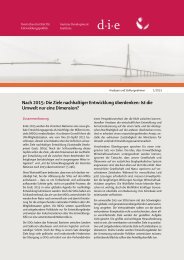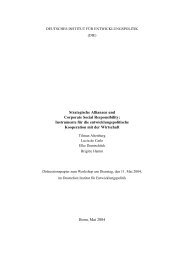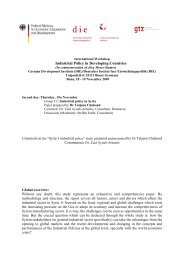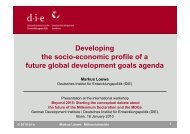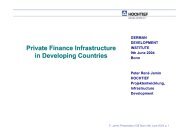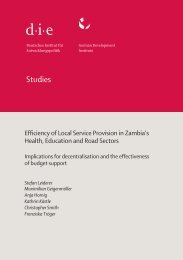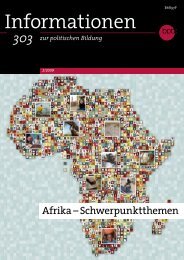Middle East / North Africa and the Millennium Development Goals ...
Middle East / North Africa and the Millennium Development Goals ...
Middle East / North Africa and the Millennium Development Goals ...
Create successful ePaper yourself
Turn your PDF publications into a flip-book with our unique Google optimized e-Paper software.
<strong>Middle</strong> <strong>East</strong> / <strong>North</strong> <strong>Africa</strong> <strong>and</strong> <strong>the</strong> <strong>Millennium</strong> <strong>Development</strong> <strong>Goals</strong><br />
– Economic growth can contribute to reducing poverty. However, <strong>the</strong>re<br />
is no automatism involved here, in particular as far as <strong>the</strong> non-economic<br />
dimensions of poverty (education, healthcare, political participation,<br />
social integration) are concerned.<br />
– The sine qua non for any lasting reduction of poverty is that development,<br />
with all its economic, ecological, <strong>and</strong> social aspects, prove<br />
sustainable.<br />
– One essential condition is a liberal economic system geared to competition<br />
<strong>and</strong> equality of opportunity. In many cases, however, <strong>the</strong>re is<br />
a need for targeted government intervention to sustain such economic<br />
systems (institutions matter!).<br />
It is on this holistic approach to development that <strong>the</strong> <strong>Millennium</strong> Declaration<br />
rests. The MDGs, on <strong>the</strong> o<strong>the</strong>r h<strong>and</strong>, are based on only two of <strong>the</strong> four<br />
central chapters of <strong>the</strong> declaration (III ‘<strong>Development</strong> <strong>and</strong> poverty eradication’<br />
<strong>and</strong> IV ‘Protecting our common environment’) The goals laid out in<br />
<strong>the</strong> chapters ‘Peace, security <strong>and</strong> disarmament’ (II) <strong>and</strong> ‘Human rights,<br />
democracy <strong>and</strong> good governance’ (V) were not included in <strong>the</strong> list of<br />
MDGs.<br />
This must be seen as problematic inasmuch as <strong>the</strong> MDG agenda is not<br />
wholly in line with <strong>the</strong> newly established, comprehensive notion of poverty.<br />
None of <strong>the</strong> MDG indicators measure deficits in human <strong>and</strong> civil<br />
rights, participation, <strong>and</strong> rule of law, in social integration <strong>and</strong> acceptance,<br />
or in social protection. Even environmental problems have been backgrounded<br />
to <strong>the</strong> extent that <strong>the</strong>y are referred to in only one of <strong>the</strong> 18 targets.<br />
Fur<strong>the</strong>rmore, <strong>the</strong> MDGs are designed above all to measure quantitative,<br />
not qualitative, dimensions. To cite an example, MDG2 measures school<br />
enrolment, but not <strong>the</strong> quality of <strong>the</strong> education provided.<br />
As to <strong>the</strong> sustainability of development, <strong>the</strong> MDGs may even have adverse<br />
effects. This entails a danger that all development-related efforts may be<br />
geared solely to a timely implementation of <strong>the</strong> MDGs, but without paying<br />
due heed to <strong>the</strong>ir long-term implications. It would, for instance, be possible<br />
to develop generous social welfare systems with a view to reducing by<br />
half <strong>the</strong> proportion of income poverty among a population in <strong>the</strong> key year,<br />
2015, compared with <strong>the</strong> year 1990. Even if this should prove successful,<br />
German <strong>Development</strong> Institute 3


